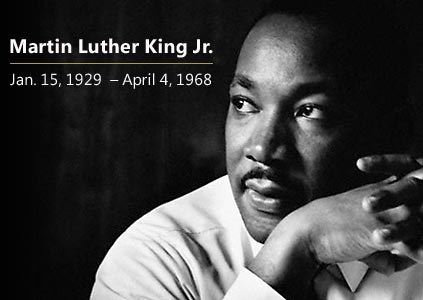 |
Martin Luther King Junior, an African American Baptist minister, wanted nothing but peace and equality. Martin campaigned for “equal rights for all” (I Have A Dream) and effectively spread the word throughout his career. Many call this period of history the Civil Rights Era, which occurred under King’s leadership in the 1950s and 60s. King carried out his peaceful protests around the United States, but the campaign had its share of effects around the world. Dr. King not only advocated strong principles of peace and equality, but also utilized his world class speaking skills on behalf of human rights. King’s capacity to see light in the sometimes dark human heart makes him a hero in the eyes of all people, regardless of color. Martin embodied the very definition of a hero, a light in often clouded surroundings.
King revolutionized the way people protested during the 1900s. Demonstrations of outrage tended to be violent in nature at the time, but King showed that speaking out peacefully has a much stronger impact for a cause. A prime example is when Martin delivered his stirring “I Have A Dream” speech in front of thousands of people in Washington, DC. His speech, focused around peacefully securing the rights of all humans, hoped that one day everyone of every color could come together and love one another (David Garrow). As a young boy growing up, Martin became fascinated with Gandhi’s way of communicating by speaking in front of masses of people to support his cause (David Lewis). Gandhi effectively spread word of his principles by organizing vast marches and protests amongst the very people that the demonstration was directed towards. Martin Luther King followed his example.
Dr. King devoted his life to not only helping minorities to have a voice in their rights, but everyone. He organized more than 5,000 civil rights demonstrations ranging from bus boycotts to speaking in front of thousands (Albert Raboteau). Martin also founded the Southern Christian Leadership Conference (SCLC), an organization that promoted non-violent protests against racism and segregation. By starting this program, he set forth that everyone would stand up for their rights peacefully, but also aggressively when needed. Martin can be considered a hero because of his painstaking effort to promote world peace and equality.
In 1968, Martin was shot dead while attending a demonstration that he led. Ironically (or perhaps because Dr. King knew his end was near), he gave a speech the night before, stating that “the fight must continue, even though I will be gone” (Martin’s Final Speech). Although Dr. King’s life was prematurely cut short, his hard work and tireless dedication to ending racism can still be seen and felt in the United States and around the world.
Dr. King’s death is considered by many to be the end of a great civil rights era. I, however, see his passing as the beginning of a new age, an age where people fight for what they believe in until the very end, which is exactly what he did. Dr. King saw the one light blazing in everyone’s hearts, even if it was cloaked by the shadows of prejudice and discrimination. He led America into the light, making many realize that humans could come together and help each other in times of need. We should all strive to articulate ourselves as well as this wonderful man, to stand firm in our convictions and not let the darkness of hatred fall over us. Perhaps Dr. King was right, maybe all this world needs is a little bit of light.
Page created on 10/26/2010 12:00:00 AM
Last edited 10/26/2010 12:00:00 AM
